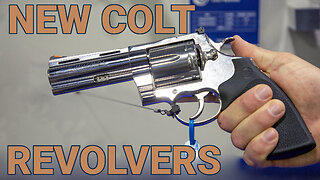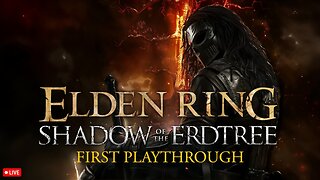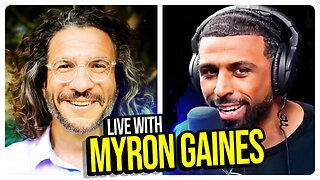Premium Only Content

What Is PRS and Why You Should Give It a Try
Navasota, Texas is the home to Texas Precision Matches -- the largest Precision Rifle Series club in the country. With little experience in PRS, Texas Precision Matches gave me a crash course on PRS, and along the way, I learned why this sport is growing.
PRS is a long-range rifle match series, in which competitors face 8 to 10 unique stages or courses of fire. Stages vary, with competitors seeing various props and prop transitions, positions, and shot and time elements that challenge shooters. A typical PRS stage features multiple steel targets located 300 to 1,200-yards.
The closest target at the match I shot was 410-yards, and the furthest stretched out to 950-yards. My favorite was the unicorn at 711-yards, though there were plenty of other targets -- u-shaped and diamond, to name a few -- arranged in bushes and over water for a diverse shooting experience.
As an action-shooter, I thought PRS would be boring. It was not! Each stage offered different challenges, planning, and execution. There is extreme gratification when you hear "Impact," indicating a successful hit.
In PRS, bolt-action and gas rifles are the most commonly used, although there is a separate rimfire series. The most popular cartridges you'll see are 6mm and 6.5 -- which covers a lot of ground, everything from 6.5 Creedmoor and 6.5 Grendel to 6mm ARC and 6mm Creedmoor.
PRS shooters couple their rifle with a long-range scope, and, for the most, are ready to go. Of course, there are always upgrades you can add, such as handguard weights, bipods, sandbags, etc. PRS can be as simple or complex as you make it.
Not everyone has a long-range rifle or "good glass" on hand; therefore, there is a slight barrier to entry. Fortunately, at clubs like Texas Precision, rifles are on-hand, ready to be loaned to those who want to try PRS. One of the reasons this club has been so successful is because they make PRS accessible to new shooters. They also encourage coaching, mentorship, and design stages that are challenging for the experienced shooter and achievable by the novice.
If you are not in Texas to enjoy Texas Precision, I encourage you to reach out to your local PRS club and talk to the match director about getting started in the sport. Alternatively, find a mentor who can share their knowledge with you.
The biggest thing I learned about PRS is it's not about the actual shooting. It's more about knowing how to make wind calls, dialing in your gear, and building a stable position after transitioning. Wind calls, or knowing what direction and speed the wind is at, helps shooters anticipate where their hold will be.
On a similar note, dialing in the scope using ballistics, rifle and gear data, weather information, and DOPE ensure success on target. (While that may all seem rather complicated thanks to modern technology, tablet and phone apps take care of the heavy lifting.)
Finally, building a stable position is key! Any movement from your body directly translates to movement of the gun, which affects accuracy. There are plenty of other aspects to PRS -- that I know long-range guys and girls are screaming about -- but that's why it's helpful to find a match mentor who can happily step-in and show you the ropes.
PRS was an entirely new experience for me. Previous to this match, I had never shot PRS. The furthest distance I had shot regularly before this match was 200-yards. Preconceived notions made me think PRS would be a boring sport, but I found it was exciting, challenging, and addictive.
Attending a match series lowered the barrier of entry for me. I had access to guns and an incredible amount of knowledge that made even the furthest target engagement result in a victorious shout of "impact" from the spotter.
If you are on the fence about PRS, go ahead and reach out to your local match director to see how they can help. If you are a match director, do what you can to help those new shooters. Step up and grow the sport, both as a whole and at your local club.
Take note from places like Texas Precision, who attract clientele by helping and encouraging new shooters. If you're an experienced PRS shooter, mentor new shooters by celebrating successes and giving tips on improvement. Not to mention, loan them some gear to get started.
-
 1:58
1:58
Guns.com
2 days ago $0.32 earnedNRAAM 2025: New Colt Anaconda .45 + Blued Python
5381 -
 LIVE
LIVE
Wayne Allyn Root | The Root Reaction
2 hours agoThe Root Reaction | 28 April 2025
157 watching -
 LIVE
LIVE
GrimmHollywood
7 hours ago🔴LIVE • GRIMM HOLLYWOOD • SHADOW OF THE ERDTREE FIRST PLAYTHROUGH • PART 1
83 watching -
 LIVE
LIVE
LFA TV
1 day agoThat Big, Beautiful Wall Around the Vatican | TRUMPET DAILY 4.28.25 7PM
166 watching -
 1:19:06
1:19:06
Kim Iversen
4 hours agoEpstein Victim DEAD at 41, Ruled Suicide. Suspicious? | The Left DOUBLES DOWN on Extremism
51K24 -
 2:38:55
2:38:55
vivafrei
10 hours agoLive with Myron Gaines - from Global Politics to the "Manosphere" & Everything in Between
91.7K65 -
 1:28:38
1:28:38
Redacted News
4 hours agoEUROPE'S BLACKOUT CRISIS "Nothing works!" & Israel's Silent War vs Iran just got worse | Redacted
102K107 -
 1:07:19
1:07:19
Candace Show Podcast
3 hours agoFarewell Show: LIVE With Ian Carroll | Candace Ep 183
76.8K99 -
 33:37
33:37
Kimberly Guilfoyle
7 hours agoThe First 100 Days: Interview with Bienvenido President Abraham Enriquez | Ep217
56.3K7 -
 42:58
42:58
Stephen Gardner
3 hours ago🔥BOOM! Trump's NEW EO just changed EVERYTHING!!
44K40